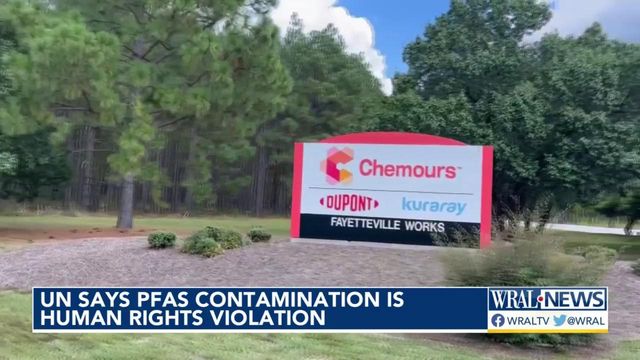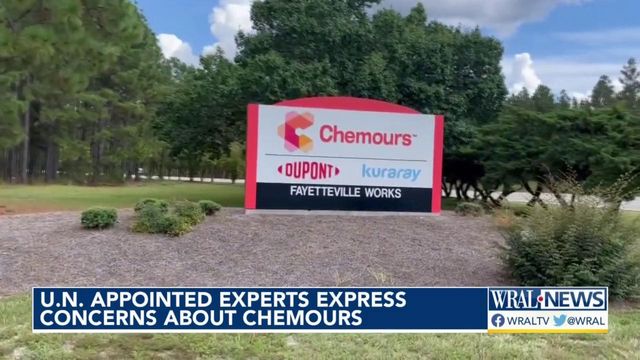UN group calls out Chemours for violating human rights, polluting the planet & lying about the danger of PFAS
A group of independent researchers appointed by the United Nations Human Rights Council has accused Chemours of violating human rights by contaminating the environment with toxic chemicals
Chemours and Dupont have admitted to dumping forever chemicals, also known as PFAS, into the Cape Fear River for decades, contaminating the drinking water supply for hundreds of thousands of people. Many of those people are still figuring out how to access clean water.
The letter also calls out the EPA, NCDEQ and courts for what it calls “inadequate” enforcement and remedy of legal action and accused Chemours of global PFAS contamination.
The group also sent a letter to the United States government:
"We would like to bring to the attention of your Excellency’s Government information we have received concerning alleged human rights violations and abuses against residents along the lower Cape Fear River in North Carolina. This is in relation to the residents’ chronic exposure to dangerous quantities of per- and polyfluoroalkyl substances (PFAS), chemicals that are released from the Fayetteville Works facility, which is a manufacturing plant of the Chemours Company LLC (Chemours) previously owned by E.I DuPont de Nemours (DuPont), which later merged with Dow Chemical Company and split into three separate companies: Dow, DuPont, and Corteva Agriscience. Chemours and DuPont are companies domiciled in the United States of America, with operations also abroad.
Alarmingly, reports indicate that Chemours intends to expand its PFAS production and has applied to North Carolina’s Department of Environmental Quality for an air permit to do so. Reports also indicate that the Fayetteville Works facility has received PFAS waste from a facility in the Netherlands."
The UN group said, based on the information they received, that the company is accused of the following:
Contaminating the environment with PFAS
"For more than forty years, Fayetteville Works has been releasing a variety of toxic PFAS into the local environment, contaminating the air, soil, and water sources," the UN group said in a letter to the U.S. government. "This has made the river water unsafe to drink for 100 river miles. Unbeknownst to them, public water authorities have been supplying contaminated water from the river to local residents, including residents of Brunswick County, Pender County, Bladen County, Cumberland County, and New Hanover County.
Residents have also been using this water to grow their crops, for personal use, and to fill up their swimming pools. In addition to contamination from the wastewater dumped in the river, PFAS air emissions are also polluting water sources. As the air PFAS emissions land on soil, they infiltrate and contaminate groundwater."
The group said that a petition filed to the EPA in October 2020 found 54 known PFAS that were identified and attributed to Chemours.
An analysis of Chemours wastewater and stormwater discharge was required by a Consent Order that was entered in Bladen County Superior Court in 2019. Unidentified PFAS chemicals were detected in this analysis – in addition to the 54 already known PFAS.
In the letter, the group said PFAS pollution from Fayetteville Works has affected fish, livestock and crops.
"This means that residents’ food sources are also contaminated with PFAS," the group said.
The EPA said the total level of PFAS found in a fish sample taken from the Cape Fear River in 2013 was 17,200 parts per trillion (ppt). The level of PFOS, one type of PFAS, in that sample was 4,700 ppt, according to the EPA.
"This level surpassed the EPA's health advisory for PFOS in drinking water, which recommends that levels should not surpass 0.02 ppt."
This means the level of PFOS in that sample was 2,350% greater than the EPA recommendation.
Study says 97% of residents had PFAS in their blood
"Biomonitoring studies, which measure chemicals in biological organisms, highlight the high exposure to PFAS in the lower Cape Fear River watershed. In one study, certain types of PFAS were found in 97% of local residents tested. Another study showed that PFAS stay in the human body for a long period of time; months after the facility stopped releasing certain PFAS chemicals, the blood of 99% of adults and 100% of children who were tested still contained these PFAS chemicals.
This information is concerning, especially considering the existing scientific evidence linking PFAS exposure to infertility, miscarriages, lung diseases, and different forms of cancer, among other adverse health impacts."
'DuPont and Chemours facilities have significantly contributed to the widespread contamination of the planet with toxic, synthetic PFAS'
The group said in the letter that DuPont and Chemours facilities disregarded environmental protections with its decades-long dumping of toxic waste, leading to widespread contamination.
"DuPont and Chemours facilities have significantly contributed to the widespread contamination of the planet with toxic, synthetic PFAS chemicals that will not easily degrade.
In addition to facilities in the United States of America including in North Carolina, West Virginia, and New Jersey, DuPont and Chemours have operations in several countries around the world that contributed to the global toxic PFAS pollution. Scientists have found PFOA anywhere in the world they have tested for it."
Importing GenX from the Netherlands to NC
North Carolina Governor Roy Cooper sent a letter to EPA Administrator Michael Regan, urging the EPA to reverse the decision. The importation has been paused.
The group said the Fayetteville Works facility has been receiving hazardous PFAS waste from The Netherlands since 2014 – from the production of the toxic chemical GenX.
So what is this toxic GenX chemical?
The toxic chemical GenX is a type of PFAS.
"GenX, the 6-Carbon PFAS compound that Fayetteville Works continues to produce, is especially mobile and rapidly reaches groundwater," the group said. "It is also more difficult to filter GenX out of water than other longer-chain PFAS compounds. PFAS chemicals have been discovered in private wells in over a 10-mile radius of the Fayetteville Works plant."
Evading liability and insufficient remediation efforts
In the letter, the group said DuPont and Chemours have not taken responsibility for the damage they've caused to residents' health and the environment.
"DuPont and Chemours have done little to assume responsibility and redress the immense human rights impacts as well as the health, pollution, and financial burdens they have placed on affected communities," the group said.
Chemours could owe more than $400 billion in damages
The group said the companies have only paid a very small percentage of what would be needed to remediate the damage they've caused.
The companies have faced numerous lawsuits regarding the damage they've caused to people and the environment. DuPont and Chemours have settled several lawsuits, but the group said the companies have only paid a small fraction of what is actually owed.
"Some estimate that $400 billion will be needed to clean and protect the nation’s drinking water," the group said.
The group also said DuPont and Chemours have not taken serious measures to prevent PFAS pollution or protect local residents from PFAS exposure.
"According to the information received, DuPont and Chemours did not implement adequate measures to reduce PFAS air emissions polluting water wells in North Carolina," the group said. "DuPont failed to install thermal oxidizer technology to control PFAS air emissions at Fayetteville until a 2019 Consent Order compelled the company to do so, following litigation by the North Carolina Department of Environmental Quality and Cape Fear River Watch (a local NGO based in Wilmington, North Carolina) against the company."
In 2017, the Cape Fear Public Utility Authority sued DuPont and Chemours for the past, present and future costs necessary to treat its public drinking water supply. It also sought punitive damages for the companies' "conscious disregard and indifference to the rights and safety of others." This lawsuit is still pending.
DuPont may have restructured in order to evade liability
In the letter, the group said the company evaded liability by merging with and creating several new companies.
- In July 2015, DuPont transferred its "Performance Chemicals" business activities, which included PFAS activities, to Chemours, a new publicly traded company.
- In 2017, DuPont merged with the Dow Chemical Company, resulting in the formation of a new company called DowDuPont.
- DowDuPont later split into three separate companies:
- Dow
- DuPont
- Corteva Agriscience
The group said this restructuring "led to disagreements around liability between some of the companies involved and added a substantial layer of difficulty for those seeking remediation and compensation."
The group also said there's been speculation about whether DuPont created Chemours with the intention of evading liability for the PFAS contamination it has caused.
In 2023, the Cape Fear Public Utility Authority filed a lawsuit to prevent the financial restructuring of the companies responsible for the PFAS pollution from Fayetteville Works.
Victims end up footing the bill for DuPont and Chemours' wrongdoings
As of February 2023, the Cape Fear Public Utility Authority is the only public water facility with a granular activated carbon PFAS filtration system in place in North Carolina. The utility spent more than $43 million in taxpayer dollars to install the filter, and rate payers have seen an increase in their water bills as a result of contamination by the chemical companies.
Many residents in other affected areas are still consuming water that's contaminated with PFAS.
The group said this places the burden of remediation on the victims, who are forced to install expensive, specialized filters that have to be replaced every 6 to 24 months.
Impeding access to information and spreading disinformation
The group said that DuPont has been aware of the health risks of PFAS for decades, but that information only became available recently when the company was sued.
"Despite knowing about the toxic character of PFAS, DuPont withheld the information from the public and continued to deny the toxic harms caused by PFAS," the group said. "Even as DuPont and Chemours knew their discharges of PFAS to the environment were poisoning local drinking water sources and making people ill, at times fatally, the companies continued to produce, market and profit from PFAS."
The group said DuPont lied to the public and the EPA about the dangers of PFAS.
"In the 1950s, a Stanford University study showed that PFAS binds to proteins in human blood," the group said. "By the 1960s and 1970s, both DuPont and 3M conducted studies that demonstrated that PFAS chemicals have 'toxic effects' and pose health risks, including liver damage. In 1975, DuPont even warns 3M about 'toxic effects' of PFAS in food packaging.
According to the information received, DuPont and Chemours have refused to disclose to the public the volumes of their discharges of PFAS to the environment."
In effect, the group said the public has not been able to fully understand the impacts of their exposure to the range of PFAS released from the Fayetteville Works facility.
Group says EPA has not done enough
In the letter, the group also said the EPA has taken part in impeding the public's access to information and spreading disinformation. The group said the EPA did not properly test PFAS, and they highlighted several instances in which the EPA denied requests to test PFAS.
"It is crucial for the aforementioned testing and studies conducted by EPA and the Agency for Toxic Substances and Disease Registry to be carried out in a timely manner in order to protect people’s right to information and their right to an effective remedy," the group said.
Delaying necessary regulatory protections
Instead of taking the necessary steps to ensure the safety of residents and the environment, the group said DuPont and Chemours have been trying to delay any new protective measures.
"The information received suggests that DuPont and Chemours have impermissibly captured the EPA and delayed its efforts to properly regulate PFAS chemicals," the group said.
Although the EPA has proposed enforceable federal drinking water standards for six PFAS, the proposed standards leave out dozens of PFAS produced at the Fayetteville plant. This includes the newer ultra-short-chain PFAS, which are not included in the EPA’s most recent monitoring rule concerning unregulated chemicals.
"The slow action in regulating PFAS, including establishing standards for water quality and classifying PFAS as hazardous substances, creates confusion and reinforces misinformation campaigns on the safety of exposure to these chemicals," the group said. "Many consumers rely on designation and classification by public authorities as a measure of the safety of a certain chemical and base their choices on such designation or the lack thereof.
Companies often take advantage of these informational gaps to promote their products, and consumers are left unaware of the true hazard level of a chemical."
Insufficient or inadequate efforts to enforce
In the letter, the group calls out the U.S. government and the North Carolina government for failing to hold DuPont and Chemours legally accountable.
"The public authorities in the United States have not pursued criminal charges for the massive, serious, and widespread PFAS contamination caused by DuPont and Chemours in the Fayetteville Works."
The letter cites two instances in which criminal charges were brought against DuPont – but all charges were eventually dropped.
In the instances in which DuPont and Chemours were fined, the group said the fines were inadequate and did not address the full extent of the damage caused by the companies.
In 2018, Chemours was fined $13 million by the North Carolina Department of Environmental Quality.
"Though this fine was publicized as the largest in the state’s history, it merely represented about 1% of the company’s profits that year," the group said. "In context, this meager fine is unable to effectively motivate behavior or deter violations."
In 2005, DuPont was fined $10.5 by the EPA – the largest civil administrative penalty EPA pursued under a federal environmental statute.
"Nevertheless, this figure is dwarfed when compared to the annual profits by DuPont and when contrasted with the risks and harms DuPont inflicted on residents of the Cape Fear River watershed for over 20 years," the group said.
What now?
"We are especially concerned about DuPont and Chemours’ apparent disregard for the wellbeing of community members, who have been denied access to clean and safe water for decades," the group said. "This is particularly apparent by their purposeful suppression and concealment of information on the toxic character of PFAS."
After outlining all the damage DuPont and Chemours caused, the group said it is shocked that Chemours is trying to expand its PFAS production.
"Taking these concerns into consideration, we are shocked by reports that Chemours has applied to the North Carolina Department of Environmental Quality for an air permit to expand its PFAS production."
WRAL News has covered the contamination in the documentary "Forever Chemicals: North Carolina's Toxic Tap Water."
In recent years, North Carolina has been grappling with GenX and other forever chemicals from the Fayetteville Works facility found in tens of thousands of wells and in the Cape Fear River water supply.
Forever chemicals have been linked to adverse health effects, including cancer.
In response to the letters, Chemours sought to correct "mischaracterizations" of the company and its Fayetteville Works plant.
The company highlighted its compliance with legal obligations to provide bottled water to tens of thousands of residents with contaminated wells and install mitigation methods to prevent further contamination from its Fayetteville plant. The company also said the PFAS it produces is an essential chemical needed for many industrial applications. Others say there are viable alternatives with less environmental harm.











